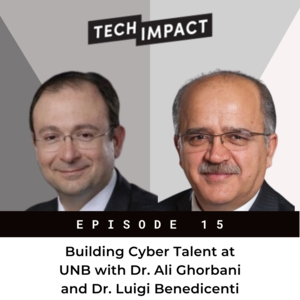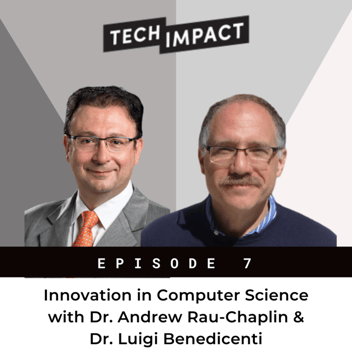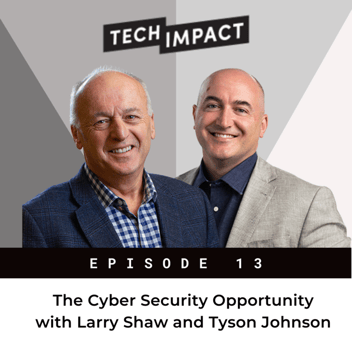EPISODE #15 Building Cyber Talent at UNB with Dr. Ali Ghorbani and Dr. Luigi Benedicenti
TechImpact
UNB CENTRAL TO OUR CYBER CLUSTER

You might say that UNB is where cybersecurity got its start in New Brunswick.
Today, we have a growing sector, with epic exits, successful spin-offs, ambitious industry organizations, a Cyber Centre, local startups and global brands like Siemens and IBM with operations here.
All of this was made possible by building upon the foundations laid at the University of New Brunswick, which, in the 1960s, became the first Canadian university with a faculty of computer science separate from that of engineering or science.
In the third and final episode of our cybersecurity miniseries on the TechTalks podcast, I’m thrilled to be joined by Dr. Ali Ghorbani, director of the Canadian Institute for Cybersecurity at UNB. Ali has spent 30 of his 40-year academic career at UNB and has been instrumental in developing the CIC, building the unique Master’s in Cybersecurity program (more on that below) and growing our international brand and reputation.
And I was also delighted to have Dr. Luigi Benedicenti, the dean of computer science at UNB, back on the show. Since arriving in Fredericton in 2017, he’s been busy growing the faculty, including focusing on cybersecurity.
So what’s so special about the UNB story? What’s happening there today? And what’s coming? My guests and I talked about this and more, including how the education, training, and research that UNB contributes are critical components of a thriving cluster.
The Start of Cyber
While computer science has a relatively long history at UNB, it wasn’t until the late 1990s that Ali’s attention began to be drawn to what was then called network or information security, which fit nicely with his background in machine learning and AI.
Then, in 2000, when a part-time student developed a novel way of reducing hostile attacks on UNB's computer network, and Q1 Labs was born, things really started to happen.
“From that, we actually created a new culture within our faculty that we can work closely with industry partners to make sure that they end up being successful,” Ali says.
This new culture shaped how the university dealt with intellectual property and interacted with business. Every Friday afternoon for over ten years, UNB and members of the research arm of Q1 Labs would meet. When IBM acquired Q1 Labs in one of New Brunswick’s richest tech exits, the meetings continued.
If you haven’t read Gordon Pitts’ excellent recent book, Unicorn in the Woods, you need to get a copy. A ripping good account of our province’s two most significant exits, it shows how much UNB has empowered and enabled a number of successful companies here, including Sentrant Security, Eyesover, Siderian, and more.

Unique in Canada
The Canadian Institute of Cybersecurity at UNB, founded in 2016, grew out of this context in which academia and industry, research and commercialization, were partners.
The vision for the institute was multifaceted: bring more companies here, increase research, train more people, and treat entrepreneurship as a core pillar to create new solutions, companies and jobs.
Today a team of 66 people from 11 countries works at the CIC. One in five has a Ph.D. It’s a bright, diverse, multidisciplinary group.
“We actually are a business-slash-academic unit, meaning that we make money in order to pay the bill for academic activities,” Ali says. “And in doing so, we have a membership scheme in place, where companies can become a member of the institute and in return receive service.”
The CIC works closely with the faculty of computer science, including the Masters of Applied Cybersecurity, a professional program for graduates with a foundational knowledge of computer science who want to specialize in cybersecurity.
“I always say that cybersecurity is a practical problem, requiring practical solutions. And therefore, in this program, we make sure there is a mix of training and labs and hands-on experience,” Ali says. Experiential learning is key to the program, including a capstone project where students work on real-world problems with industry partners.
And then there’s the Bell Research Intensive Cyber Knowledge Studies (BRICKS) program, which, along with a Masters of Applied Cybersecurity, gives students scholarship funding, a four-month research internship and, ultimately, a full-time job offer.
The demand for the program is there, both from students (and future job-seekers) and business. While organizations are crying out for talent to fill a looming jobs gap and application rates far outstrip the number of students it can accept, UNB is looking for ways to expand its current 30-seat capacity.
Talking to Luigi and Ali, I was struck, as I so often am, by how much there is to learn about what’s happening right here in Atlantic Canada and, in this case, at UNB, to grow our cybersecurity talent. The university’s deep and unique experience in cybersecurity bodes well for the future of the cluster.
To get the full story, click here to listen to the entire conversation.
Here's a peek at some highlights from this episode:
>>[07:22]: Ali on how UNB’s computer science program has long worked with industry to provide hands-on experience.
>>[16:30]: Ali on cybersecurity as an economic development opportunity.
>>[29:27]: Luigi on the province’s value proposition: “New Brunswick is a postcard, and we need to make sure that that postcard fits in the hearts of the people that come here.”
>>[35:50]: Ali on the origins of the Canadian Institute for Cybersecurity, and the need for multifaceted, multi-disciplinary expertise.
>>[42:48]: Ali on what makes the CIC unique in Canada.
DON’T MISS AN EPISODE.
Do you subscribe to the Tech Talks With Cathy Simpson podcast? If not, please do. Every week, my guests and I will be covering lots of different topics around innovation, technology and the future. Click here to listen and subscribe in iTunes. You'll find us on Spotify, Apple Podcasts, Google Podcasts, PodLink and everywhere else you enjoy podcasts.
And sign up for our newsletter to never miss an update.
Visit Techimpact's website here
.png?width=600&height=187&name=Untitled%20design%20(2).png)


